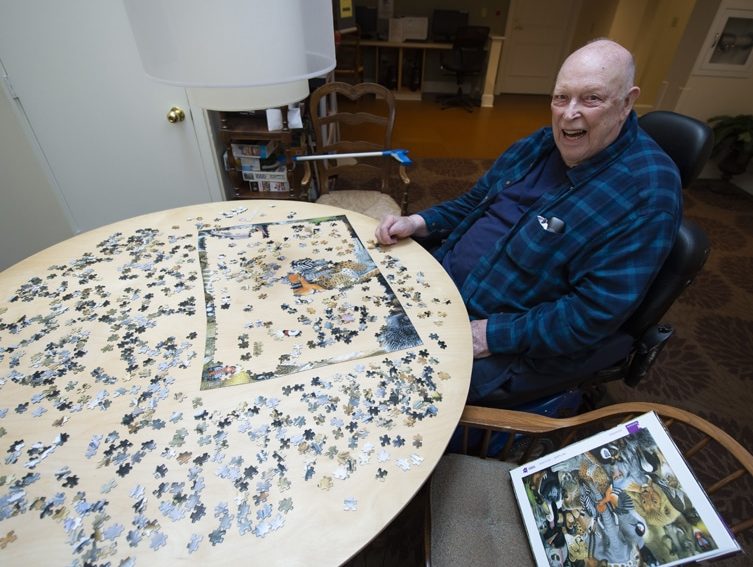
Growing up, I couldn’t get enough of puzzles. Jigsaw, crossword, rebus, word-find? Bring ‘em on! I was probably the only kid who enjoyed word problems in math class.
But as I got older, my puzzle habit waned. Occasionally, I’d take a stab at the crossword puzzle or cryptogram in the newspaper, but once that all went online my obsession with puzzles faded.
However, recently I’ve inherited our Healthy Brain Class from our resident brain expert, Eileen Joseph. And let me tell you, it’s been a shock to the system. My poor mind isn’t used to thinking outside of the box anymore. My deductive reasoning skills have seriously declined. And I have realized my brain health probably isn’t what it should be.
The good news is that it can and will improve. Did you know your brain continues to form new connections between brain cells as long as you’re doing things to create them? Mental stimulation may even help the brain generate new cells, creating plasticity that can help ward off memory loss and brain dysfunction in the future.
Says Eileen, “Neurons that fire together, wire together. We’re the architects of our own brains. It’s up to us to stay cognitively sharp.” The trick is, of course, figuring out ways to make those neurons fire.
The good news is that any mentally stimulating activity can potentially help build up your brain. Reading; academic courses; and of course, puzzles. Manual manipulation works, too. Painting, crafting, scrapbooking, and jigsaws build connections between your brain and your body.
“Novelty. Variety. Change. Be open to explore your approach to a more robust brain,” Eileen advises.
Of course, brainy activities aren’t the only thing you need. Physical exercise is important for brain health, too.
Increasing blood flow to your brain may help you increase the number of blood vessels in the part of your brain responsible for thought. Exercise also lowers blood pressure, improves cholesterol levels, helps balance blood sugar, and reduces mental stress, all of which can help your brain as well, according to Harvard Medical School.
Eating well is another way to boost brain function and health. Loading your diet with fish, seafood, nuts, and healthy unsaturated oils like olive and avocado oil reduces plaque buildup in your circulatory system that blocks blood flow to your brain, heart, and other vital organs.
Reducing your blood sugar is especially important, as type 2 diabetes is an important risk factor for dementia, as are high LDL (low density lipoprotein) cholesterol levels. Alcohol abuse and smoking also contribute to the risk of dementia.
And staying hydrated is crucial, too, because your brain is more than 70% water. So, drink up, even on winter days when you don’t feel thirsty.
Your emotional state is a factor in brain function, too. Studies show that people with chronic depression or anxiety score lower on cognitive function tests. It may be related to poor sleep, which can lead to brain fog and poor cognitive function.
And finally, friendships and an active social life can help keep your brain younger. According to the National Institute on Aging, “People who engage in personally meaningful and productive activities with others tend to live longer, boost their mood, and have a sense of purpose. Studies show that these activities seem to help maintain well-being and may improve cognitive function.”
Just like Eileen says, “Without continuous effort you’ll get a flabby brain, That’s why doing everything you can for your brain health matters.”
Good advice.
And now, I’m off to plan next week’s brain class!
Until we meet…
Donna


